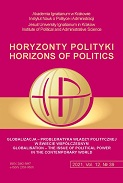Od projektu ideowego do pragmatycznej polityki: Chrześcijańska demokracja we Włoszech w początkach zimnej wojny 1943‑1948
From an Ideological Project to Pragmatic Politics: Christian Democracy in Italy in the Beginnings of the Cold War 1943-1948
Author(s): Przemysław PazikSubject(s): Christian Theology and Religion, Political history, Government/Political systems, WW II and following years (1940 - 1949)
Published by: Uniwersytet Ignatianum w Krakowie
Keywords: Christian democracy; political ideology; Giuseppe Dossetti; Alcide De Gasperi; Pius XII;
Summary/Abstract: RESEARCH OBJECTIVE: The paper attempts a comparative analysis of competitive concepts of development of the Italian Christian democratic party ( Democrazia Cristiana , DC) in the immediate post WWII period. RESEARCH PROBLEM AND METHODS: The Italian Christian democratic party was created in 1942 as a joint effort of various currents of political Catholicism in Italy. The common denominator of groups originating from prewar Christian democratic circles, student organizations and catholic, antifascist intellectuals, was an urge to overcome the legacy of fascism and to create an Ital ian democracy founded on Christian principles. Between 1943 and 1948 DC underwent an evolution from a cadre party of a distinctive ideological profile to a mass party with loosely defined ideological principles. The application of a his torical reconstruction of the subsequent phases of clashes between competitive conceptions of party allows to identify the timing and positions in this debate. THE ARGUMENTATION PROCESS: The analysis opens by recalling the context of the dissolution of the Christian democratic party in Italy in 1926 which is followed by the reconstruction of the consolidation process that took place during the WWII. Next, the focus is shifted towards the wartime ideology and programmatic achievements of catholic groups. The fourth part of the text focuses on the discussions between the leader of the DC, Alcide De Gasperi conducted with Giuseppe Dossetti on one hand – and the conservative members of ecclesiastical hierarchy – on the other. The stake of this debates was the future of the party: while De Gasperi argued for remaining in the centre of the political scene, Dossetti wanted an alliance with the “popular parties” – socialists and, not unconditionally, communists, whereas the hierarchy pushed for the establishment of a catholic conservative bloc. RESEARCH RESULTS: The attempted re construction allowed to point out that De Gasperi’s success – which consisted in holding the party unity and autonomy from the Church, had its price, which was the loosening of the ideo logical cohesion of the party. DC entered the cold war as a federation of circles and interest groups held together by a will of prolonging their power. CONCLUSIONS, INNOVATIONS AND RECCOMENDATIONS: In the concluding part of the paper I stressed the need for an in depth study of the catholic political culture of the post WWII period in order to fully understand the differences between Christian democrats and Christian democratic ideas from the interwar period, the hopes and goals of the wartime programmatic work, and the Cold War period when often these ideas were confronted with the pragmatism of a day to day politics. This is particularly important given the secularisation of the Christian democratic party in the post 1945 period.
Journal: Horyzonty Polityki
- Issue Year: 12/2021
- Issue No: 38
- Page Range: 27-47
- Page Count: 21
- Language: Polish

